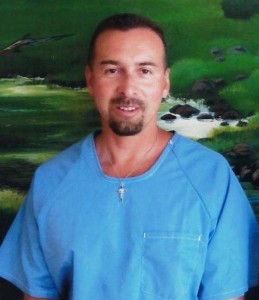Post by Scumhunter on Feb 1, 2018 2:04:45 GMT -5

(Above photo credit: California Innocence Project)
Edward Contreras, one of the many convicted defendants on the California Innocence Project (CIP) website, was convicted in 1997 of killing and helping to dismember his friend after a dispute at a backyard barbecue. However, the CIP maintains that Contreras is innocent and the only crime he is guilty of was helping to dispose his friend's body due to his fear of the actual murderer.
According to the CIP website, On August 9, 1995, a man named Scott Taylor invited Contreras along with his closest childhood friend, Frederick “Freddie” Walker, and a girl he was interested in named Lisa Garringer to a barbeque at his parents’ cabin located off a remote country road in Bouquet Canyon, California.
According to the CIP website's account, during the barbecue, a fistfight broke out between Taylor and Walker. Walker fell to the ground and hit his head on the concrete, causing him to go into convulsions. Afraid of getting arrested for assault and battery, Taylor slashed Walker with a machete. Terrified, Contreras and Garringer ran inside the cabin. Garringer frantically tried calling her mother and friends for help while also trying to keep Contreras calm so that Taylor would not kill them as well.
The rest of the account can be found in the link (along with an L.A. Times article that sheds some additional details) I'll provide below the summary but to make a long story as short as I possibly can: Contreras was accused of also participating in the murder. (It is alleged the murder was so gruesome that Walker was actually beheaded). Contreras was also accused of helping to clean up blood and body parts from the scene and driving his car to a remote area of Bouquet Canyon to dispose of the remains.
It was Lisa Garringer's own testimony that seemed to seal Contreras' fate. When police questioned the then 17-year old Garringer's, the CIP claims that police told her they already knew what the two men had done. Garringer took this to mean they wanted her to implicate Contreras and Taylor, which she did. Garringer's mother was not a U.S. citizen and the CIP alleges that Lisa was afraid that if she didn't tell police what they wanted to hear, they would deport her mother and arrest her for not reporting the crime earlier.
However, in 2009, Lisa Garringer would recant her confession. According to the California Innocence Project, Lisa and Contreras did not go to the police for days because they were afraid of Taylor. They feared he would kill them and their families.
According to a January 2012 Los Angeles Times article, a Judge ruled against a bid to free Contreras based on Garringer's recantation.
The Judge, Gregory A. Dohi, called Garringer and her mother's testimony "maddeningly inconsistent." (Garringer's mother was present when she was questioned by police).
The Deputy District Attorney had also argued that any ruling other than keeping Contreras' life sentence would be inconsistent with the felony murder rule in which participants of a crime are just as guilty as the person committing it.
The Innocence Project attorney stated it was "difficult to hear Lisa was responsible" for false testimony.
Despite stating Garringer's claims were inconsistent, Dohi seemingly contradicted himself a tiny bit (in my opinion), by stating that her claims could be valid, but that the Los Angeles Superior Court was not the proper place to decide that.
Anything I left out and the full summaries can be found at the following links:
californiainnocenceproject.org/read-their-stories/edward-contreras/
articles.latimes.com/2012/jan/11/local/la-me-contreras-20120111
Thoughts? This is a tough case in that it's not based on DNA or any other type of forensic evidence that could clear a convict, but the testimony of only one person who was a 17 year-old girl. There seems to be no dispute that Contreras helped to dispose of Walker's body. However, whether he participated in the killing is the debate.
On one hand, I can understand the argument that a teenage girl can be impressionable and prone to make false testimony. On the other hand, her mother was with her and while still young and naive was on the precipice of adulthood.
It seems Judge Dohi basically hinted, at least in my interpretation, that this is a matter that will have to be taken to the state Supreme Court rather than a local court.
Time will tell if Contreras ever gets that opportunity.
